FINAL CONCLUSIONS and RECOMMENDATIONS
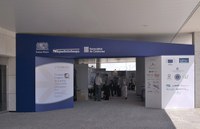 The special circumstances in which the congress has been held, soon after the devastating earthquakes that hit the Emilia-Romagna region, today, more than ever, casted a different light on our Congress.
The special circumstances in which the congress has been held, soon after the devastating earthquakes that hit the Emilia-Romagna region, today, more than ever, casted a different light on our Congress.
The geo-scientific community which met in Bologna for the 7th REgional GEOscientific cartography and information systems responsibility for the contribution that Earth Sciences had taken a key role, accepting responsibility for the 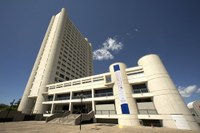 contribution that Earth Sciences can make to society as a whole, and not just during emergencies such as that ongoing in Emilia-Romagna.
contribution that Earth Sciences can make to society as a whole, and not just during emergencies such as that ongoing in Emilia-Romagna.
This Congress demonstrated once again that available detailed knowledge of the territory, both above and below the earth’s crust, is an essential requisite for territorial planning, for efficient and sustainable use of natural resources and for the prevention and mitigation of natural risks; in other words, for the safety and wellbeing of our population.
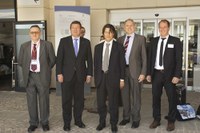 The geoscientific community has to accept that our contribution in terms of knowledge is vital andit depends on our ability to provide data, information and knowledge, needed to influence decision-making in the political arena and within public administrations.
The geoscientific community has to accept that our contribution in terms of knowledge is vital andit depends on our ability to provide data, information and knowledge, needed to influence decision-making in the political arena and within public administrations.
This congress closes a series of congresses started here in Bologna in 1994. Since than 7th editions have been held alternatively in Bologna, Munich and Barcelona. This edition of the EUREGEO, with the subheading “Sustainable Geo-Management”, has focused 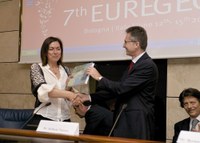 on the contribution that Earth Sciences must give to ensure that the quality of growth in the future leads to a sustainable future.
on the contribution that Earth Sciences must give to ensure that the quality of growth in the future leads to a sustainable future.
The congress Organizing Committee thinks that once again the collaboration between Emilia- Romagna, Bavaria and Catalonia, which have been working together for 20 years, still represents a successful way to attain an integrated and multidisciplinary approach to Earth Sciences. The main goal of this collaboration, driven by the desire to share best practices and methods, is to keep improving the technology at our disposal and the technical-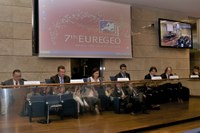 scientific capabilities of our collaborators so that we can benefit from tools for risk mitigation and for resilience policies.
scientific capabilities of our collaborators so that we can benefit from tools for risk mitigation and for resilience policies.
The Organising Committee has ensured the cooperation between the whole geological and geoscientific communities (not only regional representatives) thanks to the presence of the Eurogeosurveys and European Commission in the OC and thanks to the participation of geoscientists from academia, research centres institutions and all geological surveys of Europe and outside Europe.
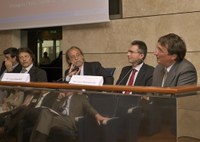 The 7th congress brought together about 750 participants from more than 40 countries. They came not only from Europe, but also from Africa, Asia, North and South America. Under the subtitle “Substainable geo-management” 168 oral presentations and 241 posters were presented in 11 scientific sessions. The 7th EUREGEO also included four special sessions, the meeting of the Eurogeosurveys National delegates, the meeting of GIT (the Geological society of Italy), the local forum of the Geopower European project and was completed by one post-congress field trip.
The 7th congress brought together about 750 participants from more than 40 countries. They came not only from Europe, but also from Africa, Asia, North and South America. Under the subtitle “Substainable geo-management” 168 oral presentations and 241 posters were presented in 11 scientific sessions. The 7th EUREGEO also included four special sessions, the meeting of the Eurogeosurveys National delegates, the meeting of GIT (the Geological society of Italy), the local forum of the Geopower European project and was completed by one post-congress field trip.
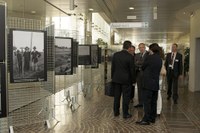 The congress has counted on 3 sponsors and 13 Exhibitors to whom we want to express our acknowledgment. We want to specially thanks all the chairperson and convenors, belonging to different national geological surveys and European institutions for their precious contribution.
The congress has counted on 3 sponsors and 13 Exhibitors to whom we want to express our acknowledgment. We want to specially thanks all the chairperson and convenors, belonging to different national geological surveys and European institutions for their precious contribution.
For the future we wish to establish new working groups which are able to react to the actual geoscientific problems to find best practises examples in a transnational way. For example, for this edition Working groups on Soil, Natural hazards, Subsurface geology (including geothermal energy, 3d Modelling, CO2 storage), Popularisation of geosciences have been set up and to keep them flexible and efficient we should focus on accurate tasks and time limit.
The regional dimension of geological and geoscientific communities working on very relevant issues for sustainable development needs to be maintained and strengthen. This will imply enlarging the participation to this initiative to other regions of Europe if appropriate.
The European dimension of this initiative should be fully recognised end endorsed by the relevant EU institutions. This may result also in a specific support activities by the European Commission and by the European “Committee of the Regions”.
Furthermore, the Organizing Committee believes that the participation to this conference should be more-oriented towards the stakeholder community relevant to geology and geoscientific information, and more-oriented towards the general public introducing some new formats of the conference for the future editions.
The Organising committee thanks all the participants and invite You in Barcelona 2015 for the 8th edition of the congress.
Bologna, 15th June 2012
The Organising Committee
Raffaele Pignone, Michela Grandi (Emilia-Romagna)
Antoni Roca, Xavier Berastégui (Catalunya)
Claus Kumutat, Roland Eichhorn (Bayern)
Luca Demicheli (Eurogeosurveys)
Luca Montanarella (European Commission)
